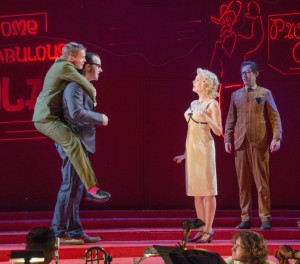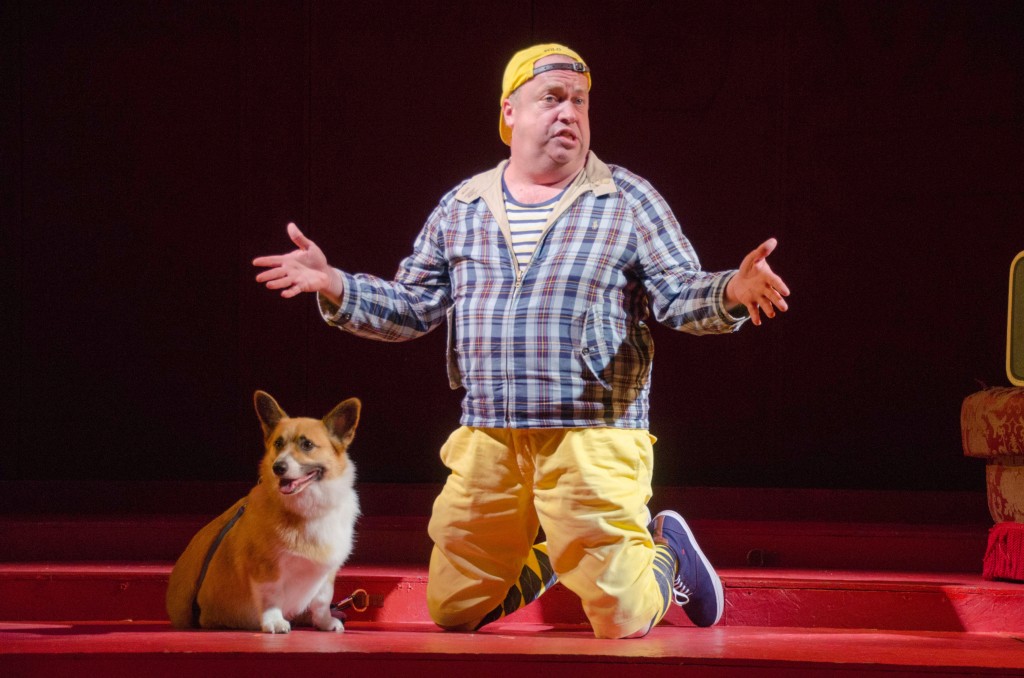Theater Review: CSC’s “The Two Gentlemen of Verona” — A Cuddly Pair of Rats
The Commonwealth Shakespeare Company’s production of The Two Gentlemen of Verona is spunky and engaging—but the play is spun in one direction, away from its weird edginess.
The Two Gentlemen of Verona by William Shakespeare. Directed by Steven Maler. Set Design by Beowulf Boritt. Presented by the Commonwealth Shakespeare Company’s Free Shakespeare. On the Boston Common, through July 28th. Free.
By Bill Marx

Valentine (Andrew Burnap), Proteus, (Peter Cambor), Silvia (Ellen Adair), and Thurio (Evan Sanderson) in CSC’s “The Two Gentlemen of Verona.” Photo: Andrew Brilliant/Brilliant Pictures.
The easy and breezy amusement offered by the Commonwealth Shakespeare Company’s (CSC’s) “Rat Pack” version of The Two Gentlemen of Verona offers further proof of what I have suspected over the years—that this outdoor Shakespeare-for-the-masses approach works best when the Bard is at his least. Last summer’s staging of Coriolanus exhibited the big sky drawbacks—the inevitable recourse to semaphore acting and overwrought micing that turns the verse into thunderous sonic mush. The infectious zest evident in the CSC’s productions of minor Shakespearean efforts such as The Two Gentlemen of Verona and The Comedy of Errors suggests that when there’s not a lot to worry about regarding the subtlety of the poetry or the characterizations, director Steve Maler and his cast members feel free to relax and let all concerned, including the audience, have fun.
In some ways, The Two Gentlemen of Verona fits neatly into a romantic comedy mode: two male friends (Proteus and Valentine) fall in love with the same woman, and they are faced with having to reconcile that love with their friendship with each other in time to finish up with a “happy” ending in which each Jack gets his correct Jill. Thought by many critics to be Shakespeare’s first play produced in London, the script proffers verse that is ping-pong witty rather than emotionally or intellectually complicated, its fast-moving plot contrivances ham-fisted to the point of hammer blows, with a dog (the “cruel-hearted cur” Crab and his doting owner Launce) trotted in to ensure guaranteed laughs from the groundlings. The notion of adding tunes to the love triangle plot has been around for awhile: in 1971 Joe Papp staged John Guare and Mel Shapiro’s musical adaptation of the script to critical applause. Maler sets his production in a ’50s/’60s neon-festooned Las Vegas populated by bell hops, show girls, squares, and Mafioso. There’s no original music, but there are standards (“Luck be a Lady,” “You’re Nobody Till Somebody Loves You,” and “Fever” among them) sung via recordings by Frank Sinatra and Sammy Davis Jr or by cast members, who generally hold their own, helped by a nimble, 5-piece jazz band.
The idea that everything, including intimate relationships, is show biz supplies plenty of visual and musical humor, including a band of bandits in the “forest” outside of Milan who are accompanied by a spaghetti Western theme. Larry Coen (Launce) and Remo Aralidi (Speed) are deft servant/stand-ups particularly during a Vegas act in which the Bard and his lack of humor becomes part of the riff. (Frankly, Shakespeare’s clowns have dated badly, though the low-down comedy stylings of Launce and his adored Crab hold up well.)
The play foreshadows a number of Shakespeare’s favorite meta-theatrical motifs, including Julia disguising herself as a man in order to follow her guy Proteus when he goes off to Milan to fall in love (instantly) with Valentine’s main squeeze, Silvia. Things are not what they seem to be, particularly between the competing men, with metamorphosis of one kind or another having its way with the inter-related couples: Valentine shifts overnight from being a roaming skeptic of romance to becoming a loyal lover, while Proteus (shape-shifting sea-god) turns from love-smitten swain into a nasty dissembler for the sake of bedding Silvia. Perhaps Julia loses herself (as Sebastian) in order to become herself, or at least her masquerade serves as a means to be constant to herself and her love.

Crab (Maestro) and Launce (Larry Coen) clowning around in the CSC’s production of THE TWO GENTLEMEN OF VERONA. Photo: Andrew Brilliant/Brilliant Pictures.
This is to say that Shakespeare, being an unruly genius, doesn’t always follow the feel-good comedy program. The theme of parasitism—the double-dealing Proteus is willing, like an Iago-in-training, to do what is necessary to see that he has Silvia and that his trusting good buddy ends up with nothing. Given that little is more American than reveling the power generated by re-invention and one-upmanship, the tongue-in-cheek hedonism of Sinatra and company is a fine fit. But Maler, for the sake of staying in the antic entertainment groove, decides to give us the mice squad rather than The Rat Pack, whose mystique was not just about cool superficiality but lethally sharkish self-regard. The comfy, romantic tunes divert our attention from the current of bitter nastiness that propels the plot (the “greatest hits” mainly serve as nostalgic filler rather than ironic counterpoint), while the colorful campiness of the staging (and costuming) turns the evening into a Shakespeare meets Guys and Dolls mashup. The production is spunky and engaging—but the play is spun in one direction, away from its weird edginess.
The CSC’s perky and personable cast provides plenty of amusement, with Peter Cambor and Andrew Burnap coming off as callow but bemusing specimens of dithering manhood. If only they evoked more of their characters’ selfishness and less of their silliness. Cambor doesn’t do much to explore how Proteus devolves into a conniving lout. Ellen Adair as Silvia and Jenna Augen as Julia can’t do the impossible: indicate why these classy ladies have any interest in their admirers. But both actresses have strong voices, and Augen displays considerable slapstick flair in the guise of Sebastian. Rick Park is admirably retrained as a mafioso Duke, while Evan Sanderson fritters away opportunities as Thurio, the suitor left out in the cold.
The infamously problematic scene in the script, which has partly pushed it to the Shakespearean sidelines, slides by here without (apparently) dampening anyone’s spirits. A mere amoral bump along the Las Vegas Strip. Proteus, after rescuing Silvia from the clutches of bandits, decides that he will rape her for his reward. Julia, disguised as Sebastian, stands by; Valentine interrupts the attempt but, once Proteus apologizes, decides to forgive his back-stabbing amigo. On the night I attended, a few members of the audience jeered at some stale one-liners from Launce about women wagging their tongues too often. Yet everyone was perfectly fine with an ending (accompanied by Sammy Davis, Jr. singing “A Lot of Livin’ to Do”!) in which a woman, knowing her man just attempted to rape another woman, lets bygones be bygones. Not quite sure what Shakespeare was up to with this ugliness—but over 400 years ago, he was obviously aware (perhaps cynically) that when audiences crave a happy ending they are willing to overlook just about anything to have it.
Bill Marx is the editor-in-chief of The Arts Fuse. For over three decades, he has written about arts and culture for print, broadcast, and online. He has regularly reviewed theater for National Public Radio Station WBUR and The Boston Globe. He created and edited WBUR Online Arts, a cultural webzine that in 2004 won an Online Journalism Award for Specialty Journalism. In 2007 he created The Arts Fuse, an online magazine dedicated to covering arts and culture in Boston and throughout New England.

It’s one of Shakespeare’s weirder comedies– and as you point out, there’s a certain values-dissonance for modern audiences.
Being that Boston audiences have had the opportunity to see two different productions of “Two Gentlemen” this season, I found that the attempt to fill out the play with songs associated with the Rat Pack, besides providing neither ironic counterpoint nor thematic exploration (as you point out), simply slowed the pacing, and provided unnecessary padding. The production by Actors’ Shakespeare Project was, by comparison, better paced (and of course, with a smaller venue) more intimate.
And really, what does it say about Maler’s own appraisal of the play that he felt the need to “spruce it up” with at least 30 minutes of unrelated material?
I seem to enjoy Shakespeare’s clowns more than you do, and at least with regard to this play, find Launce’s monologue, as well as his exchanges with Speed to be the most enjoyable writing in what is one of Shakespeare’s lesser works– and maybe because it is a lesser work, its more suited to ASP’s audiences who are more likely to be completists who like to tease out the Bard’s repeated motifs than the CSC’s audiences who are more likely to make this their only Shakespeare of the season.
I should have made it clearer that I like the clowns in this script — particularly Launce — he and Julia are the most interesting characters here. Shakespeare’s punch-line-slingers to come have not aged as well. As for the play’s weirdness, its sexual bitterness, it seems to me a director has to confront it, find a way to make the loutishness work dramatically, rather than gamble that nobody is going to notice if you play enough ‘golden oldies.’ Of course, most of our critics fell for it …